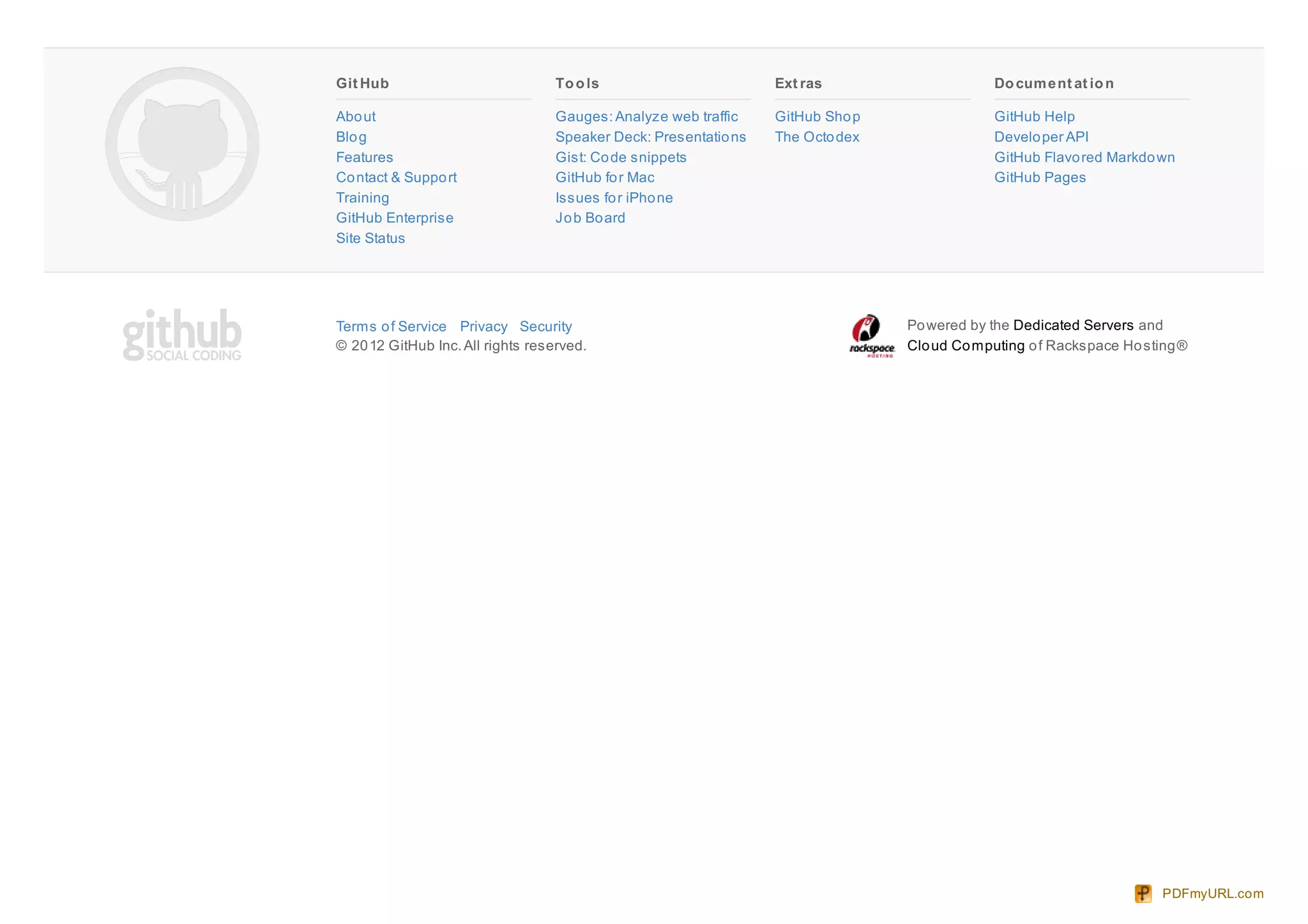The document summarizes an open source PHP driver called OrientDB-PHP that provides a way to interact with the OrientDB graph database using its binary protocol. It describes what the driver does, how to install and use it, requirements, available functions, and testing. The latest commit to the master branch of the OrientDB-PHP project bumped it to version r4606 to be compatible with OrientDB version 1.0rc8.
![commit 07b69f4a45
Latest commit to the maste r branch
Bumped to r4606
Ant onTerekhov authored January 18, 2012
Tags Downloads
AntonTerekhov AntonTerekhov // OrientDB-PHP OrientDB-PHP
Files Commits Branches
28 3
CodeCode Net workNet work Pull Request sPull Request s IssuesIssues St at s & GraphsSt at s & Graphs00 33
HTTPHTTP Git Re ad-OnlyGit Re ad-Only https://github.com/AntonTerekhov/OrientDB-PHP.git Re ad-Only access
Binary protocol for OrientDB for PHP applications (Beta) — Read more
http://code.google.com/p/orient/wiki/NetworkBinaryProtocol
ZIPZIP
21mast ermast er 3
historyhistorynamename ageage messagemessage
OrientDB January 17, 2012 Changed code to be compatible with protocol version 7 support. RECORD… [AntonTerekhov]
SpeedTest November 29, 2011 New methods $record->reset() for reset all record fields and $record-… [AntonTerekhov]
Tests January 18, 2012 Test aligned with r4597 [AntonTerekhov]
.gitignore April 19, 2011 Added .gitignore [AntonTerekhov]
LICENSE April 19, 2011 License file word-wrapped [AntonTerekhov]
example.php May 16, 2011 Huge addition on PHPDoc blocks [AntonTerekhov]
OrientDB-PHP /
Signup and PricingSignup and Pricing Explore GitHubExplore GitHub FeaturesFeatures BlogBlog LoginLogin
PDFmyURL.com](https://image.slidesharecdn.com/github-com-antonterekhov-orientdb-php-120201212154-phpapp02/75/Github-com-anton-terekhov-orientdb-php-1-2048.jpg)
![phpunit.xml November 29, 2011 Made PHPUnit verbose [AntonTerekhov]
readme.markdown January 18, 2012 Bumped to r4606 [AntonTerekhov]
speedtest.php May 16, 2011 Huge addition on PHPDoc blocks [AntonTerekhov]
readme.markdownreadme.markdown
OrientDB-PHP
A plain PHP driver to OrientDB graph database using its binary protocol.
Description
Current status is: Beta.
Code is licensed under New BSD License and provided "as is". For complete license inf ormation see f ile LICENSE .
Current OrientDB version to work with is: 1.0rc8 (revision 4606). It can be downloaded f rom OrientDB's Downloads page.
Code compatible to previous binary releases of OrientDB can be f ound in repository's tags or in Downloads section.
Requirements
This library requires:
PHP 5.3.x
spl extension (since PHP 5.3.0 this extension is always available)
PCRE extension (as of PHP 5.3.0 this extension cannot be disabled and is theref ore always present)
bcmath extension (Since PHP 4.0.4, libbcmath is bundled with PHP. These f unctions are only available if PHP was
conf igured with --enable-bcmath .). Used on 32bit systems f or dealing with 64bit long.
PDFmyURL.com](https://image.slidesharecdn.com/github-com-antonterekhov-orientdb-php-120201212154-phpapp02/75/Github-com-anton-terekhov-orientdb-php-2-2048.jpg)
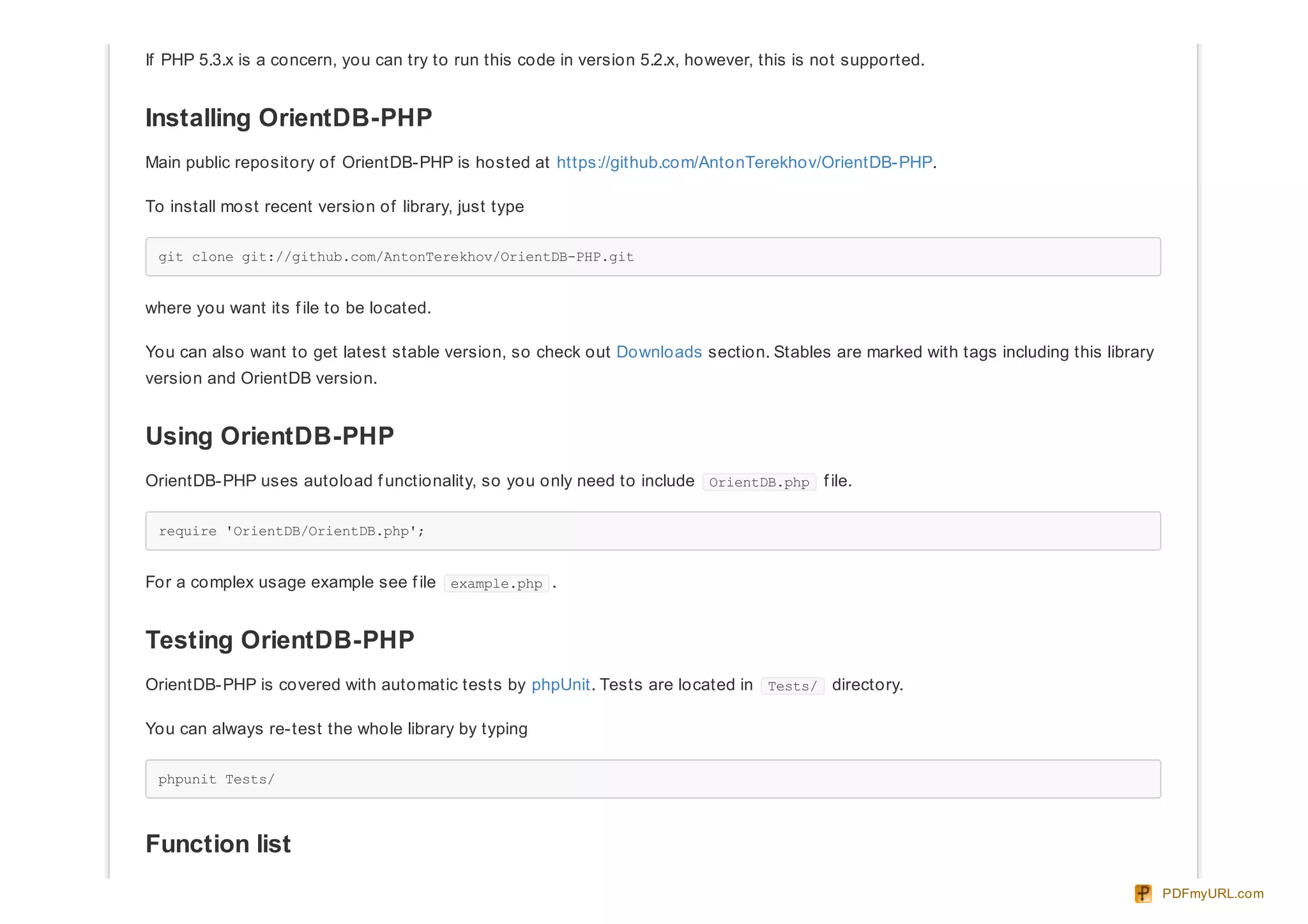
![Some f unctions requires to be already connected to OrientDB server (using connect() ) or to have database opened (using
DBOpen() ). This can be ref erenced at protocol description. If sequence is wrong - exception OrientDBWrongCommandException will
be thrown and no interaction with server will be made.
Create a new instance of OrientDB class
$db = new OrientDB(string $host, int $port[, int $connectTimeout]);
Example:
$db = new OrientDB('localhost', 2424);
Connect to server
Connects to OrientDB server (not database) with user and password specif ied. Returns true on success or throws exception.
bool $db->connect(string $userName, string $password);
Example:
$connected = $db->connect('root', 'passwd');
Database functions
DBOpen
Open database f or work with or throws exception on f ailure (non-existent DB, wrong login or password). Return array consist of
cluster inf ormation and conf ig.
array $db->DBOpen(string $dbName, string $userName, string $password);
Example:
PDFmyURL.com](https://image.slidesharecdn.com/github-com-antonterekhov-orientdb-php-120201212154-phpapp02/75/Github-com-anton-terekhov-orientdb-php-4-2048.jpg)
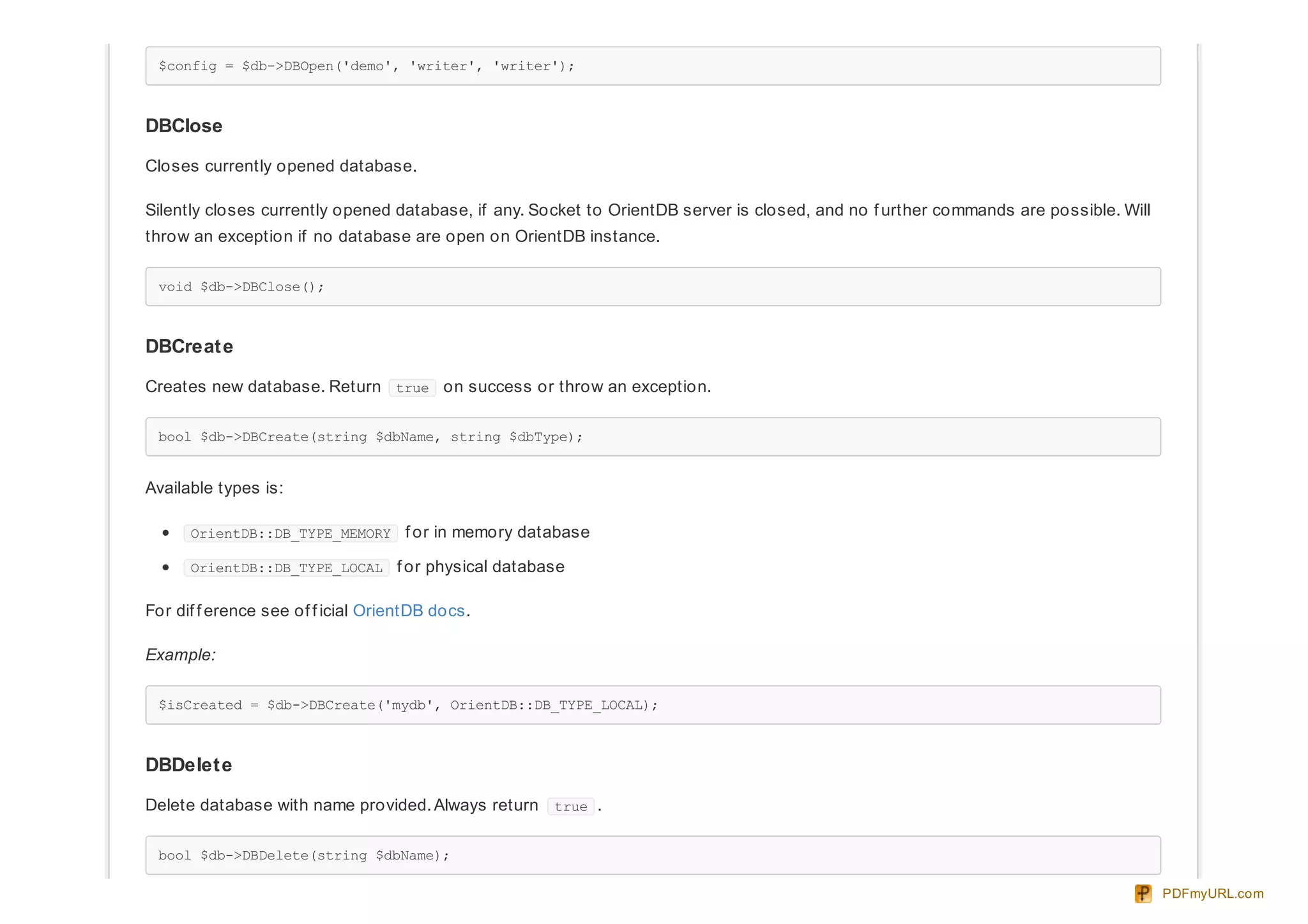
![Example:
$result = $db->DBDelete('testdb');
DBExists
Checks if database with name provided is exists. Return true on success, false is no database exists or throws an exception.
bool $db->DBExists(string $dbName);
Example:
$isExists = $db->DBExists('demo');
Record manipulation functions
recordCreate
Create record in specif ied cluster with content and type. Returns record position in cluster.
int $db->recordCreate( int $clusterID, string|OrientDBRecord $recordContent[, string $recordType]);
Available record types are:
OrientDB::RECORD_TYPE_BYTES
OrientDB::RECORD_TYPE_DOCUMENT
OrientDB::RECORD_TYPE_FLAT
Def ault type used is OrientDB::RECORD_TYPE_DOCUMENT .
Example 1:
PDFmyURL.com](https://image.slidesharecdn.com/github-com-antonterekhov-orientdb-php-120201212154-phpapp02/75/Github-com-anton-terekhov-orientdb-php-6-2048.jpg)
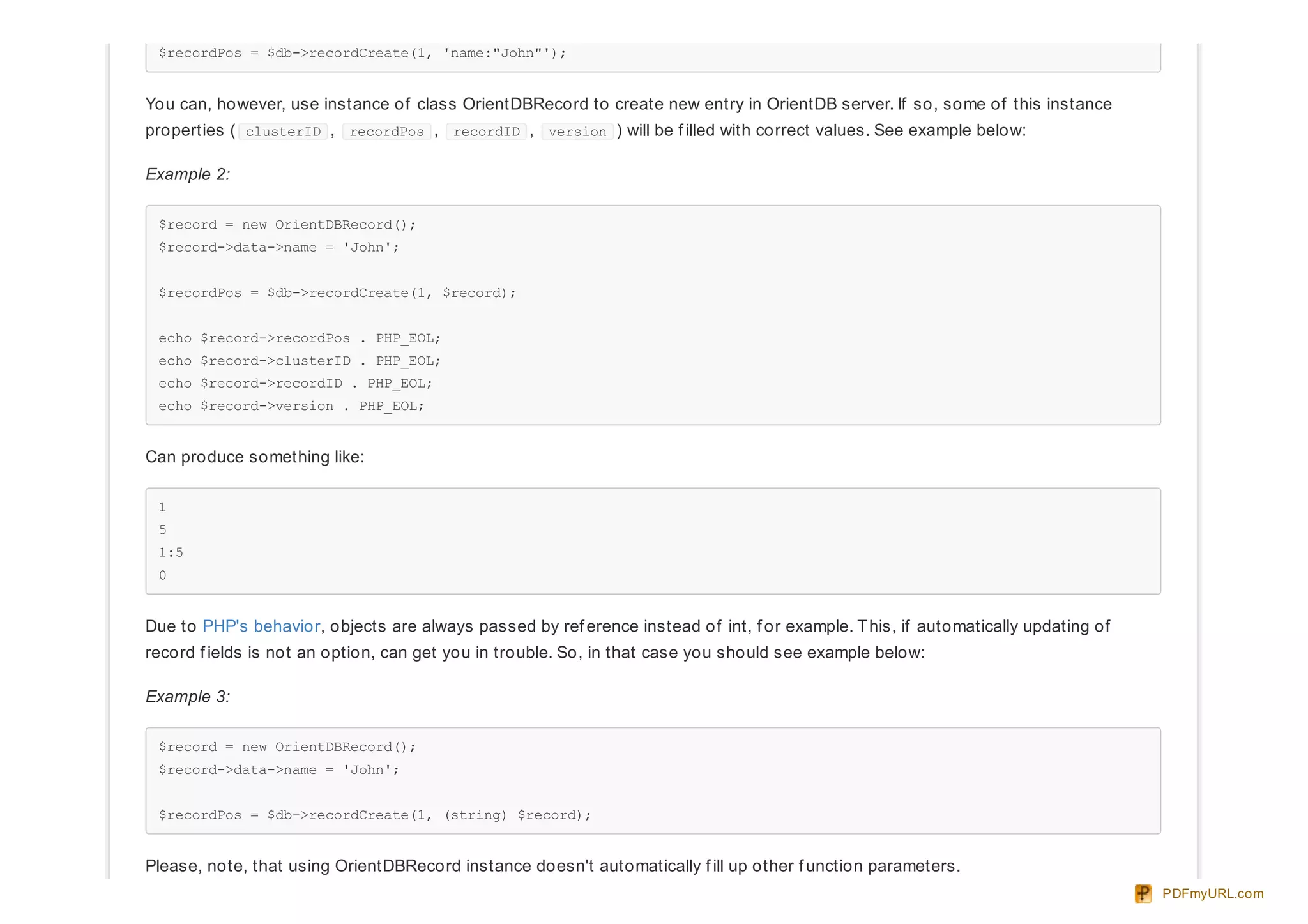
![recordDelete
Delete record with specif ied recordID and optionally, version. Returns true on success, false otherwise or throws an
exception.
bool $db->recordDelete(string $recordID[, int $recordVersion]);
Def ault version is -1 . This means no version check will be done.
Example:
$result = $db->recordDelete('1:1');
$result = $db->recordDelete('1:1', 1);
recordLoad
Load record by recordID and, optionally, f etchplan. Returns record or false . In some cases (e.g. recordPos is out of f ile bounds)
can throw an exception
OrientDBRecord $db->recordLoad(string $recordID[, string $fetchPlan]);
Def ault f etchplan is *:0 , which mean load only record specif ied.
Example:
$record = $db->recordLoad('1:1');
If f etchplan is explicit and there are some records returned by OrientDB, they located in $db->cachedRecords as associative array
with keys f rom recordIDs and values are record themselves.
This example
PDFmyURL.com](https://image.slidesharecdn.com/github-com-antonterekhov-orientdb-php-120201212154-phpapp02/75/Github-com-anton-terekhov-orientdb-php-8-2048.jpg)
![$record = $db->recordLoad('1:1', '*:-1');
var_dump($db->cachedRecords);
Will produce something like this:
array(2) {
["11:0"]=>
object(OrientDBRecord)#178 (8) {
...
During next call to any method which is able to populate $db->cachedRecords (e.g. recordLoad() or command() ) this array will
be reset.
recordUpdate
Update record with specif ied recordID and, optionally, version. Returns new record version on success, -1 otherwise or throws an
exception.
int $db->recordUpdate(string $recordID, string|OrientDBRecord $recordContent[, int $recordVersion[, string $recordType]]);
Def ault version is -1 . This means no version check will be done.
Available record types are:
OrientDB::RECORD_TYPE_BYTES
OrientDB::RECORD_TYPE_DOCUMENT
OrientDB::RECORD_TYPE_FLAT
Def ault type used is OrientDB::RECORD_TYPE_DOCUMENT .
Examples 1:
$version = $db->recordUpdate('1:1', 'Name:"Bob"');
PDFmyURL.com](https://image.slidesharecdn.com/github-com-antonterekhov-orientdb-php-120201212154-phpapp02/75/Github-com-anton-terekhov-orientdb-php-9-2048.jpg)
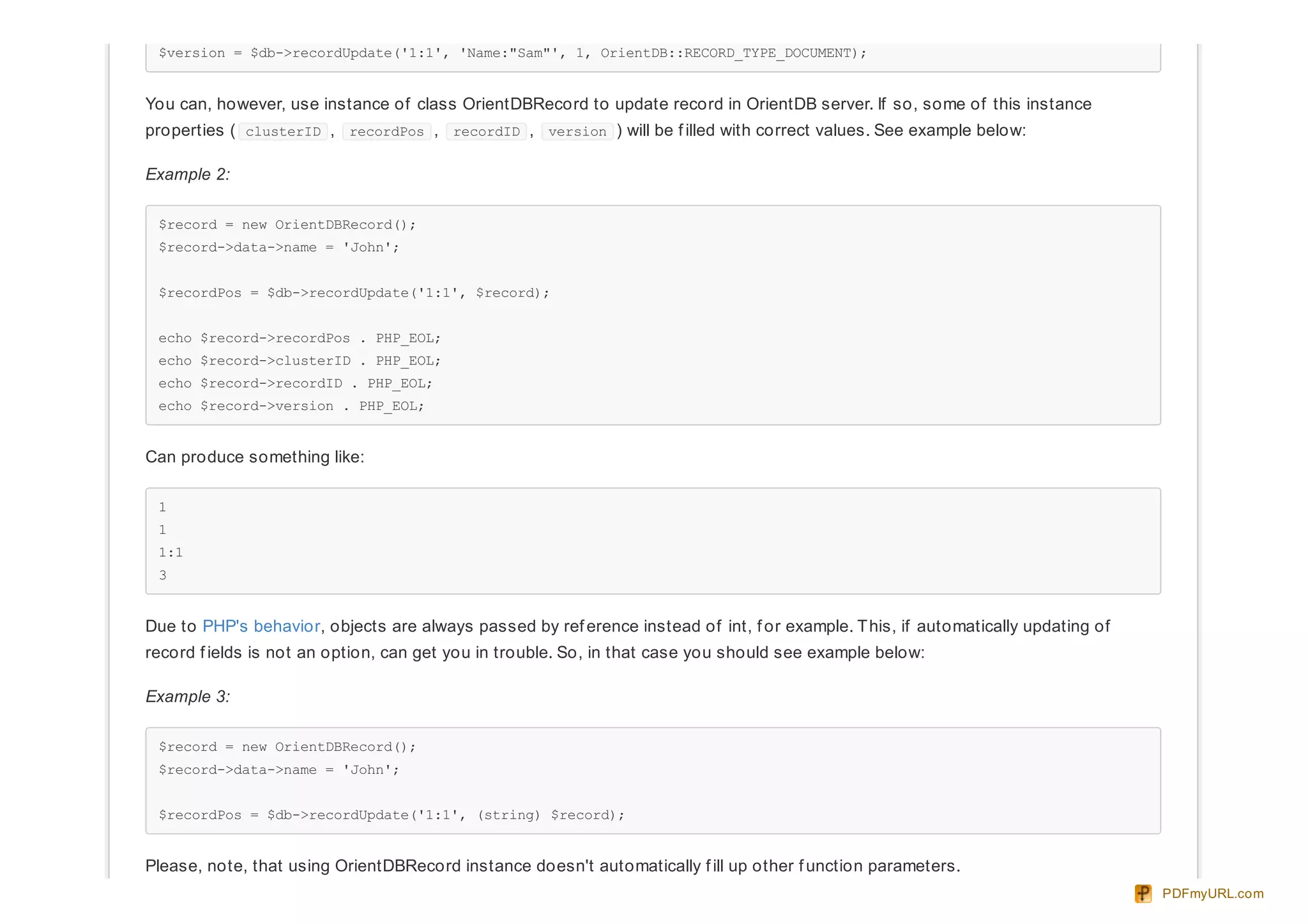
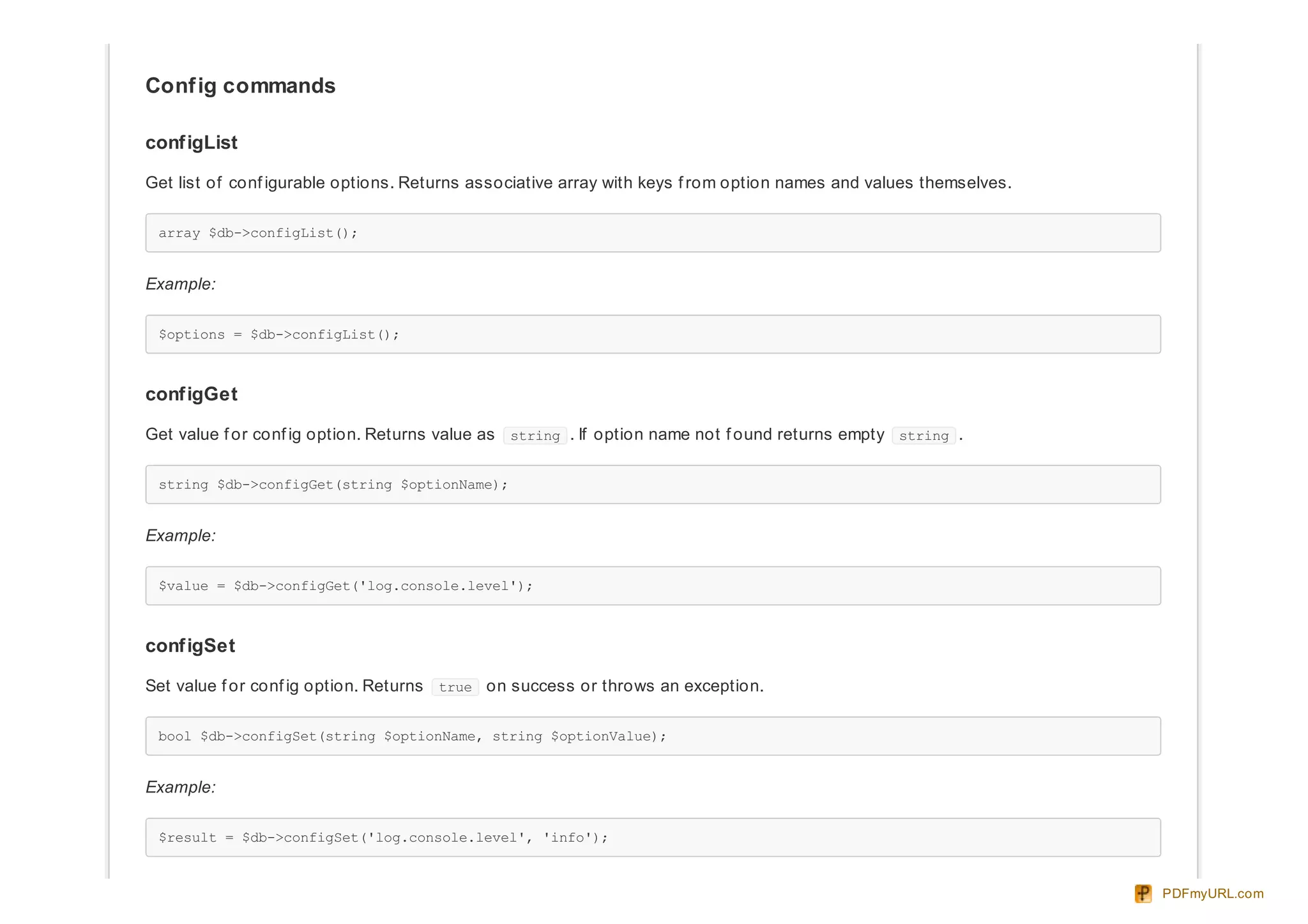
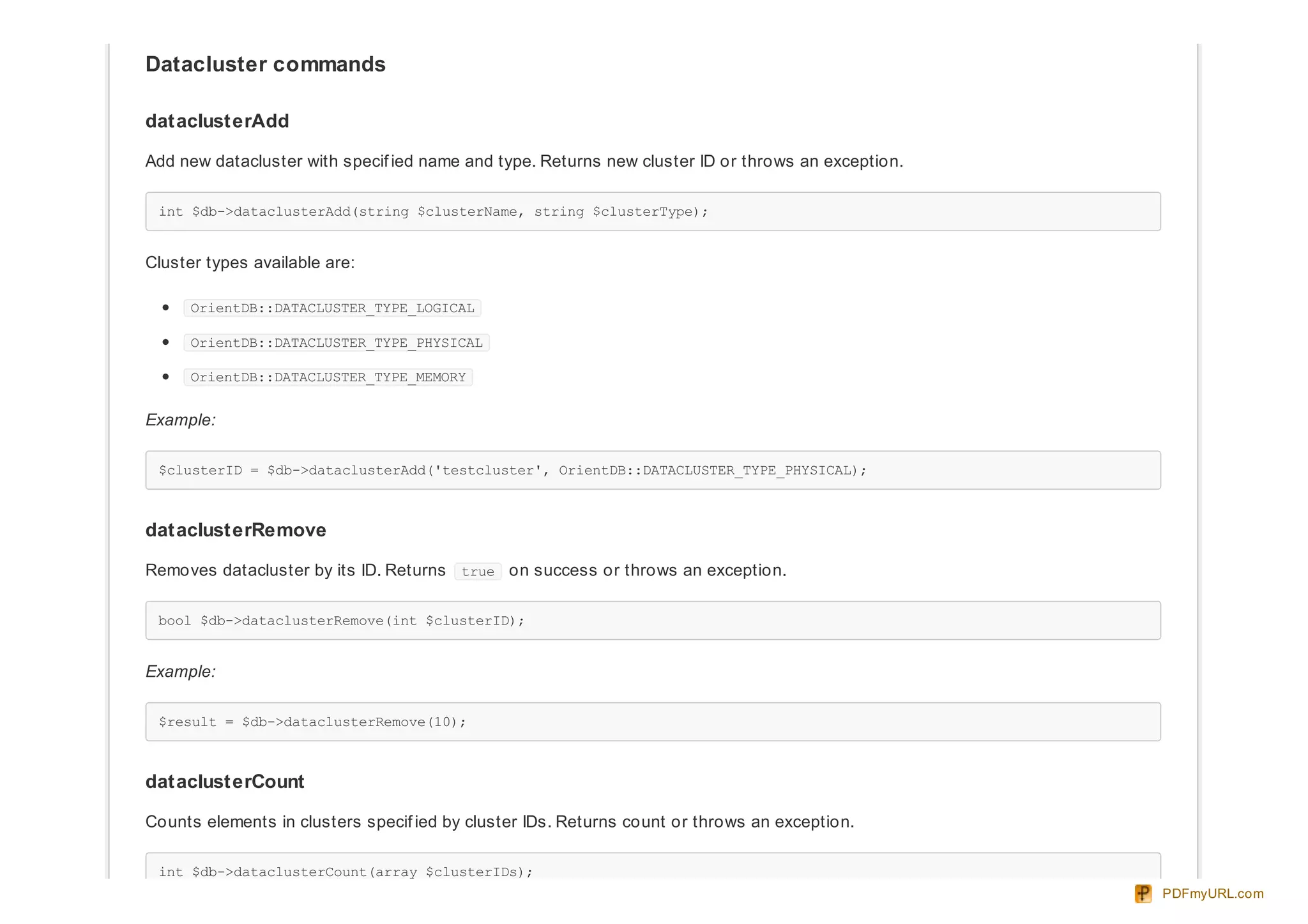
![Example:
$count = $db->dataclusterCount(array(1, 2));
dataclusterDatarange
Returns datarange f or specif ied cluster ID. Returns array of start and end positions or throws an exception.
array $db->dataclusterDatarange(int $clusterID);
Example:
$data = $db->dataclusterDatarange(int $clusterID);
array(2) {
["start"]=>
int(0)
["end"]=>
int(126)
}
commit
Commits a transaction. Not yet implemented.
count
Get count of records in cluster specif ied by clusterName. Returns int or throws an exception.
int $db->count(string $clusterName);
Example:
PDFmyURL.com](https://image.slidesharecdn.com/github-com-antonterekhov-orientdb-php-120201212154-phpapp02/75/Github-com-anton-terekhov-orientdb-php-13-2048.jpg)
![$newcount = $db->count('default');
Querying server
command
This command provide an ability to execute remote SQL commands. Returns mixed or throws an exception.
mixed $db->command(int $commandMode, string $query[, string $fetchplan]);
Command mode is required to be properly match with query text.
Command modes available are:
OrientDB::COMMAND_QUERY - f or general queries, including INSERT , UPDATE , DELETE , FIND REFERENCES , etc.
OrientDB::COMMAND_SELECT_SYNC - only f or SELECT in synchronous mode
OrientDB::COMMAND_SELECT_ASYNC - only f or SELECT in asynchronous mode
Fetchplan is used to pre-f etch some records. Fetchplan is only available in OrientDB::COMMAND_SELECT_ASYNC mode. Using
f etchplan will populate $db->cachedRecords array as f or recordLoad() .
Def ault f etchplan is *:0 .
Examples:
$records = $db->command(OrientDB::COMMAND_SELECT_ASYNC, 'select * from city limit 7');
$records = $db->command(OrientDB::COMMAND_SELECT_ASYNC, 'select from city traverse( any() )', '*:-1');
$false = $db->command(OrientDB::COMMAND_SELECT_SYNC, 'select from 11:4 where any() traverse(0,10) (address.city = "Rome")');
$links = $db->command(OrientDB::COMMAND_QUERY, 'find references 14:1');
$record = $db->command(OrientDB::COMMAND_QUERY, 'insert into city (name, country) values ("Potenza", #14:1)');
$updatedCount = $db->command(OrientDB::COMMAND_QUERY, 'update city set name = "Taranto" where name = "Potenza"');
$deletedCount = $this->db->command(OrientDB::COMMAND_QUERY, 'delete from city where name = "Taranto"');
PDFmyURL.com](https://image.slidesharecdn.com/github-com-antonterekhov-orientdb-php-120201212154-phpapp02/75/Github-com-anton-terekhov-orientdb-php-14-2048.jpg)
![select
Is an alias f or command(OrientDB::COMMAND_SELECT_SYNC, string $query).
mixed $db->select(string $query);
Example:
$records = $db->select('select from city traverse( any() )');
selectAsync
Is an alias f or command(OrientDB::COMMAND_SELECT_ASYNC, string $query[, string $f etchplan]).
mixed $db->selectAsync(string $query[, string $fetchplan]);
Example:
$records = $db->selectAsync('select * from city limit 7', '*:-1');
query
Is an alias f or command(OrientDB::COMMAND_QUERY, string $query).
mixed $db->query(string $query);
Example:
$records = $db->query('insert into city (name, country) values ("Potenza", #14:1) ');
shutdown
PDFmyURL.com](https://image.slidesharecdn.com/github-com-antonterekhov-orientdb-php-120201212154-phpapp02/75/Github-com-anton-terekhov-orientdb-php-15-2048.jpg)
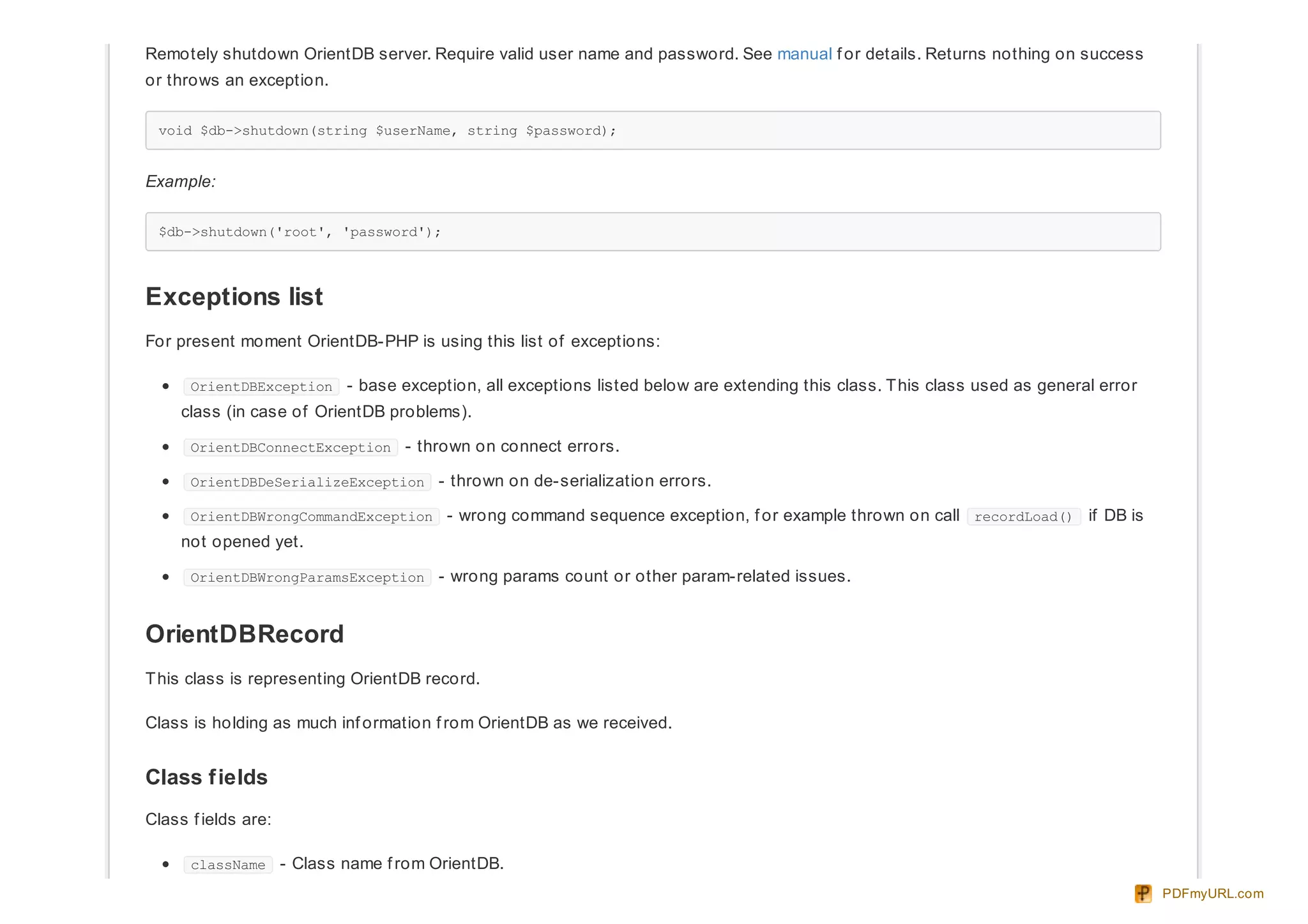
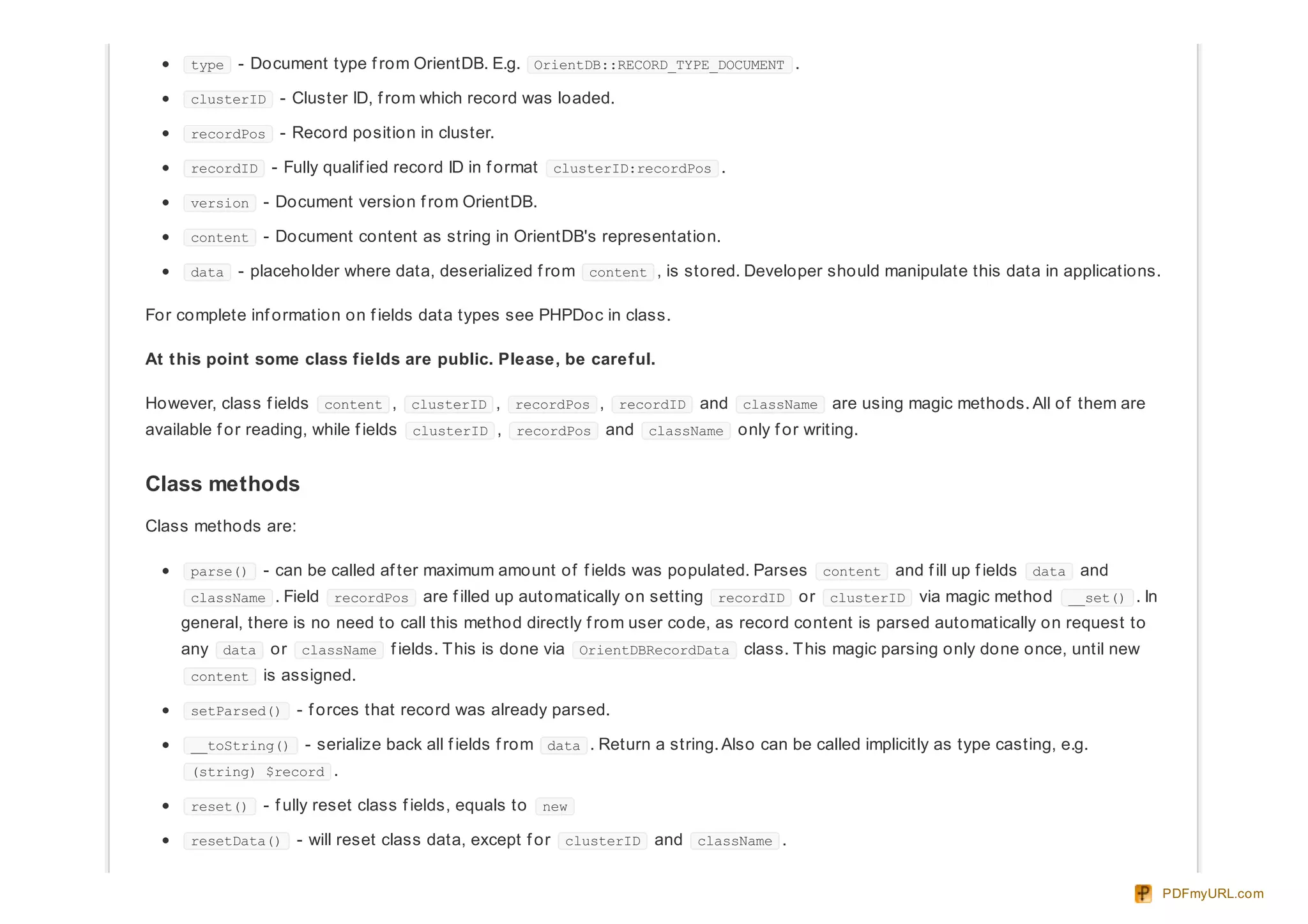
![Class is able to parse almost any record f ormat as received f rom OrientDB server. However, there are some limitations about f ew
Java primitive data types, e.g. short. This is a planned TODO.
Examples
recordLoad:
$record = $db->recordLoad('12:1', '*:2');
var_dump($record);
will produce
object(OrientDBRecord)#197 (9) {
["className"]=>
string(7) "Address"
["type"]=>
string(1) "d"
["clusterID"]=>
int(12)
["recordPos"]=>
int(1)
["recordID"]=>
string(4) "12:1"
["version"]=>
int(0)
["content"]=>
string(61) "Address@street:"Piazza Navona, 1",type:"Residence",city:#13:0"
["data"]=>
object(stdClass)#172 (3) {
["street"]=>
string(16) "Piazza Navona, 1"
["type"]=>
string(9) "Residence"
["city"]=>
object(OrientDBTypeLink)#195 (1) {
["link":"OrientDBTypeLink":private]=>
PDFmyURL.com](https://image.slidesharecdn.com/github-com-antonterekhov-orientdb-php-120201212154-phpapp02/75/Github-com-anton-terekhov-orientdb-php-18-2048.jpg)
![["link":"OrientDBTypeLink":private]=>
string(4) "13:0"
}
}
}
recordCreate
$record = new OrientDBRecord();
$record->data->FirstName = 'Bruce';
$record->data->LastName = 'Wayne';
$record->data->appearance = 1939;
$recordPos = $db->recordCreate($clusterID, (string) $record);
var_dump($db->recordLoad($clusterID . ':' . $recordPos));
will produce
object(OrientDBRecord)#176 (9) {
["className"]=>
NULL
["type"]=>
string(1) "d"
["clusterID"]=>
int(1)
["recordPos"]=>
int(138)
["recordID"]=>
string(5) "1:138"
["version"]=>
int(0)
["content"]=>
string(50) "FirstName:"Bruce",LastName:"Wayne",appearance:1939"
["data"]=>
object(stdClass)#179 (3) {
["FirstName"]=>
string(5) "Bruce"
PDFmyURL.com](https://image.slidesharecdn.com/github-com-antonterekhov-orientdb-php-120201212154-phpapp02/75/Github-com-anton-terekhov-orientdb-php-19-2048.jpg)
![["LastName"]=>
string(5) "Wayne"
["appearance"]=>
int(1939)
}
}
Datatypes
Due to small quantity of PHP's built-in datatypes, this library is introducing some own datatypes.
OrientDBLink
Used to link records with each other.
Two variants of constructing new instance is available:
OrientDBTypeLink(string $value);
String value can be def ined with or without leading hash sign.
OrientDBTypeLink(int $clusterID, int $recordPos);
Example 1: String with hash sign
$link = new OrientDBTypeLink('#100:99');
echo $link . PHP_EOL;
echo $link->getHash() . PHP_EOL;
echo $link->get() . PHP_EOL;
echo $link->clusterID . PHP_EOL;
echo $link->recordPos . PHP_EOL;
Example 2: String without hash sign
PDFmyURL.com](https://image.slidesharecdn.com/github-com-antonterekhov-orientdb-php-120201212154-phpapp02/75/Github-com-anton-terekhov-orientdb-php-20-2048.jpg)
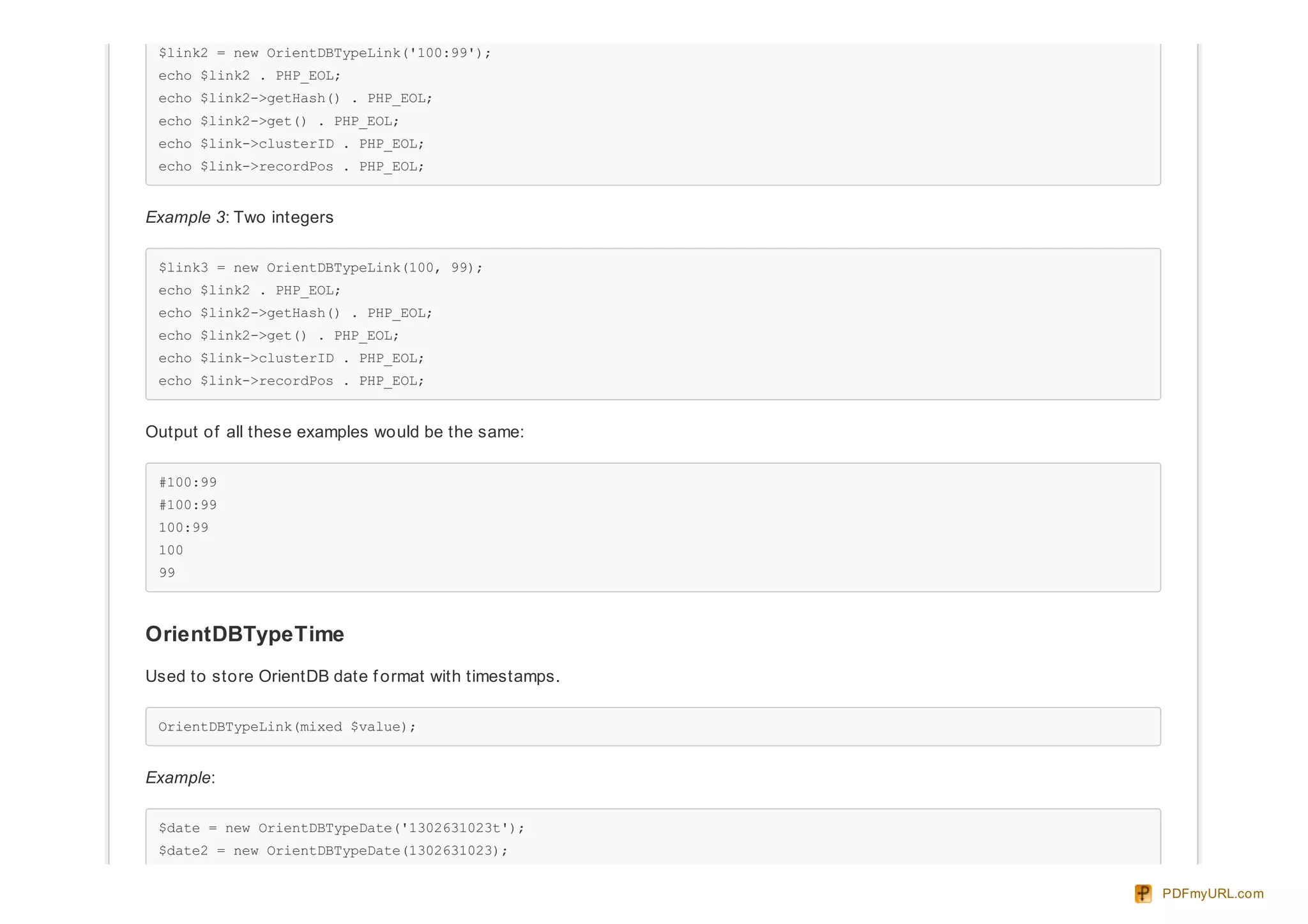
![echo (string) $date . PHP_EOL;
echo $date->getValue() . PHP_EOL;
echo $date->getTime() . PHP_EOL;
Both $date and $date2 will output the same:
1302631023t
1302631023t
1302631023
Debugging with OrientDB-PHP
For debug purposes you can enable or disable debug output at anytime.
Example:
$db->DBOpen('demo', 'writer', 'writer');
$recordPos = $db->recordCreate($clusterID, $recordContent);
$this->db->setDebug(true);
$record = $db->recordLoad($clusterID . ':' . $recordPos);
$this->db->setDebug(false);
$result = $db->recordDelete($clusterID . ':' . $recordPos);
The above example will output debug messages only f or recordLoad() to standard output stream (browser or console) in this
manner:
0 : 1e 00 00 00 04 00 01 00 00 00 00 00 00 00 8f 00 [................]
10 : 00 00 03 2a 3a 30 [...*:0]
>request_status
0 : 00 [.]
>TransactionID
0 : 00 00 00 04 [....]
>record_status_first
PDFmyURL.com](https://image.slidesharecdn.com/github-com-antonterekhov-orientdb-php-120201212154-phpapp02/75/Github-com-anton-terekhov-orientdb-php-22-2048.jpg)
![0 : 01 [.]
>record_content
0 : 00 00 00 0c [....]
0 : 74 65 73 74 72 65 63 6f 72 64 3a 30 [testrecord:0]
>record_version
0 : 00 00 00 00 [....]
>record_type
0 : 64 [d]
>record_status_cache
0 : 00 [.]
Planned TODOs
Full support on Java primitive data types, e.g. short or byte.
Possible more OOP-style work with OrientDBRecord.
Possible using libevent f or selectAsync().
Support f or async mode f or RECORD_CREATE, RECORD_UPDATE, RECORD_DELETE
Support f or converting string 'true' to actual boolean true (and other values) in SQL
Known bugs
Connecting to OrientDB instance, which is listening 0.0.0.0 (def ault f or OrientDB) can cause errors. Change to 127.0.0.1 in
Orient's conf iguration. See issue
If you found a bug
If you f ound a bug - f eel f ree to contact me via gitHub, email, or open a new issue.
PDFmyURL.com](https://image.slidesharecdn.com/github-com-antonterekhov-orientdb-php-120201212154-phpapp02/75/Github-com-anton-terekhov-orientdb-php-23-2048.jpg)
